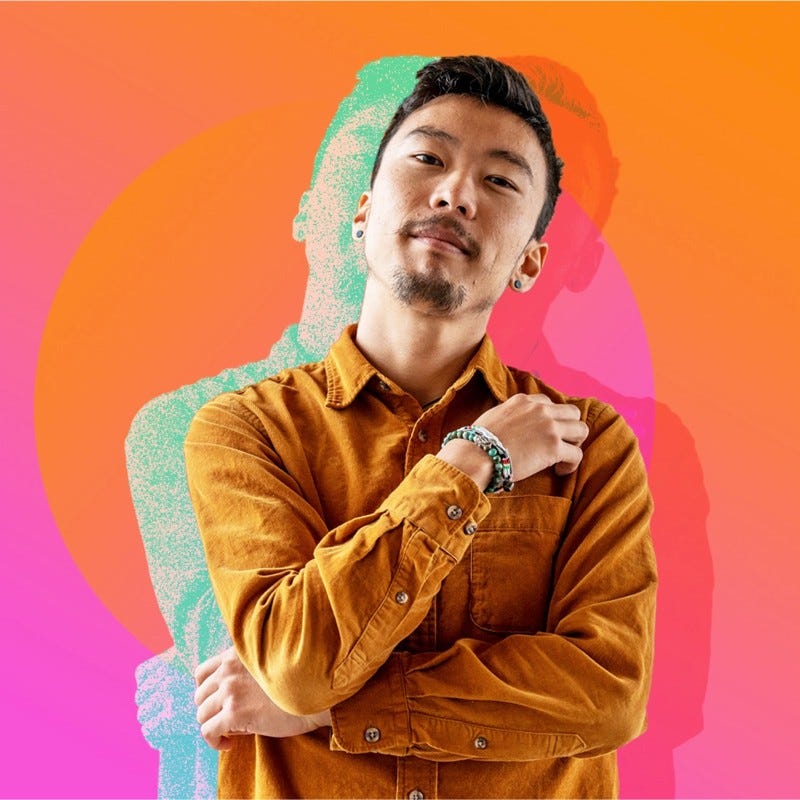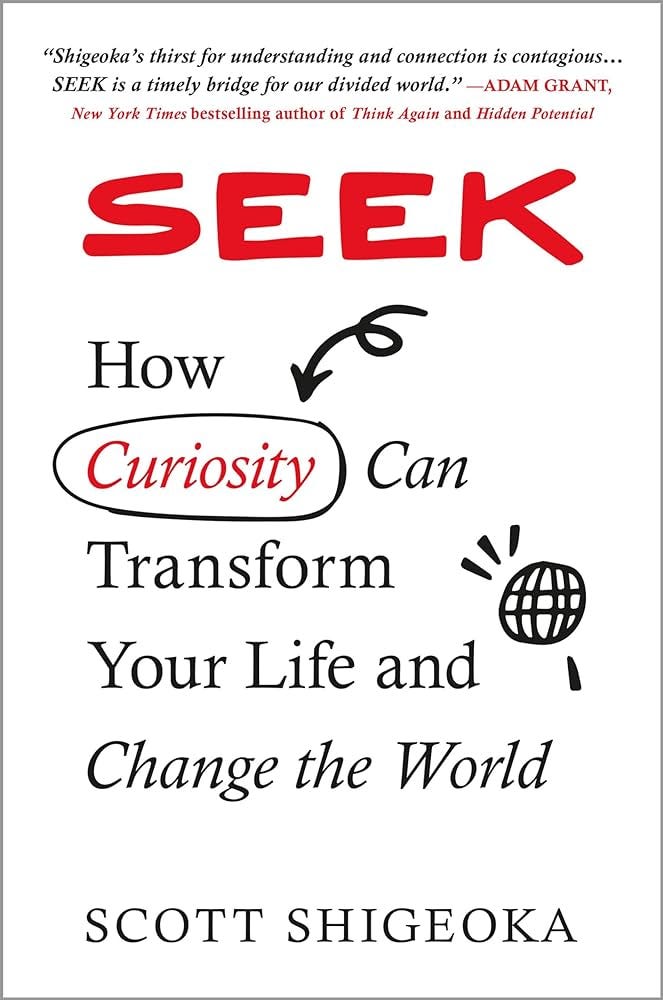Countering the 'era of incuriosity'
5 questions for author and curiosity hype man Scott Shigeoka
This week’s episode of The Wise Unknown is a heartsploder. Don’t miss meeting the man who helped Ashley Judd break silence. Just hearing his voice makes me tear up. This is a deep one.
Curiosity is so core for me. It’s the thing that animates so many of my choices, my creative projects, my relationships with intimates and strangers alike. It’s like the circulatory system of my whole life—the way it’s all connected and flows and pumps and pulses. I was raised with no explicit religion, but I always felt like my parents implicitly taught us: Be kind to everyone. Be curious about everything. Trust your own outrage.
I found echoes of their teachings all over Scott Shigeoka’s awesome new book, Seek: How Curiosity Can Transform Your Life and Change the World. Scott is exuberant, one of those bright, bright lights whose generosity is palpable from minute one. This is a very accessible read, but also a studied, sober exploration. What a rare and wonderful combination. Without further ado, meet Scott…
Courtney Martin: Why this book at this moment?
Scott Shigeoka: We live in what I call the “era of incuriosity,” a world that’s filled with disconnection and division. This isn’t just something we feel on a collective level, it's felt individually—and if you’re reading this, you have likely experienced this in your own life. Whether on social media, at a parent-teacher conference, or in your workplace or family, relationships are breaking and conflicts are at an all-time high.
And it’s not just the yelling—it’s the silence, too. Yes, people are lashing out and screaming at those on the “other side” of politics, the Israel-Palestine crisis, severity of COVID-19, or gun rights. But at least they’re speaking to each other. There’s a whole lot of people who have simply chosen to end their relationships with siblings, decades-long friendships, parents, neighbors, or colleagues because of their differences, too. After the 2016 presidential race there was a Reuters/Ipsos poll that found 1 in 6 respondents said they had stopped all communication with a friend or family member because of the election. And as we crest into yet another presidential election year, I’m afraid we’re bound to see even more cutting and canceling of those we once deemed as ‘loved ones.’
That's why I wrote Seek. I wanted to speak directly to this moment we’re living in, but writing in a way that’s uplifting, optimistic, and forward-looking. I didn’t want to just write another division or polarization book that pointed out how we were hurting and othering. I also wanted to remind people of our natural-born ability to be curious that can help us to move toward healing and belonging instead. When we choose to better understand ourselves and others beneath the surface, it actually opens us up to be in meaningful connection and conversation with those we hold differences with.
What I also learned is that curiosity serves a much greater purpose than bridging the divide—the research finds that practicing it daily can extend your longevity and improve the quality of your life: Curious people are associated with higher levels of happiness, positive relationships, well-being, and life satisfaction. And in a time when there are forces in the world that seem to be crushing these aspects of our humanity and lives, I’m excited for Seek to bring more healing, harmony, and transformation into readers’ lives.
You write: “We tend to limit our understanding of curiosity by talking about it as a force for extracting information.” Say more about the extractive dangers of curiosity without wisdom? You also call this “predatory curiosity” at other points in the book.
We often think about curiosity as an intellectual pursuit, one that exists solely in our mind. We want to know what tree is in our backyard or how many people Beyoncé amazed in her Renaissance Tour. But curiosity is also a heart-centered pursuit. We can use it to learn more about ourselves or other people around us—even those who are very different from us. We don’t just collect data about a person’s life, we hear their values, stories, and what makes them human. We find commonalities.
But in order for us to do this, to access this kind of connection, we have to take our curiosity deeper. I call this “deep curiosity.” It’s a soulful practice where we don't just have the goal of knowing, we are searching to understand. A metaphor I often use is this: If traditional curiosity is looking through the peephole of a door, deep curiosity is turning the knob and going through it to experience what's on the other side. It’s much more exposing and vulnerable, but these risks give you the greatest potential for transformation.
Predatory curiosity is when we connect to others with an agenda. It’s when someone asks you questions for that “gotcha!” moment. Or they’re asking questions because they’re trying to get you to say something that they can use against you. This is kind of what a detective or a prosecutor might do. It looks like curiosity, but it’s not because there’s an attachment to a specific outcome.
Sometimes this is done in nefarious ways as I mentioned, but other times we might do it unconsciously. We ask our partner a question because we want them to ask that question back to us. When they don’t, we lash out and say: “Why didn’t you ask me the same question back?!”
Or you ask a question about politics at the family reunion, but when someone says a position that differs from you, you immediately jump into the offensive and argue the points they’re making instead of saying something like: “Tell me more.”
This kind of curiosity isn’t truly open-hearted, and thus, can be transactional or extractive. It’s not real relationship building.
I think that the way that boys and men are socialized in the U.S.--despite all the shifts--actually discourages deep curiosity and that this is a huge intersectional issue. Can you talk a bit about gender and curiosity?
Boys and men are told by the adults around them, the media they consume, and other cultural forces that if they appear to be dominant and independent (often associated with masculine qualities), then they will be seen as stronger than those who might be introspective, sensitive, or emotionally expressive (which are often associated with feminine qualities). This can breed what psychologists call “self-silencing,” which is the dismissal or erasure of one’s own thoughts, feelings, and needs. A study by de Medeiros and Rubinstein in 2015 found that men’s self-silencing practices were largely influenced by the desire to appear stoic and stable—often tending to restrict their conversations to small or superficial topics and emotionally isolating themselves from others.
Thankfully, a lot of this is changing with more boys and men in today’s culture. There's a meteoric rise of men’s groups and more boys are being parented in a way that is mindful of gender roles and socialization. Many of us tell boys and men: It’s okay to cry, that is not weak. Exploring your inner world is an important part of life. You don’t have all the answers, and will have to rely on others. Non-sexual physical affection and emotional connection with other boys and men is key to powerful relationships.

As with economic class, where everyone sort of thinks they’re middle class even though they definitely are not, I wonder if curiosity is the kind of thing that the vast majority of people think they do pretty well, when really many of us are probably garbage at it. What do you think? How can we have an accurate self-assessment about how curious we actually are as we move through the world?
We know from the research that the most curious among us are older adults. But our social narratives make us believe that it’s only for children (because they ask “why?” over and over again) or that it’s only for creatives and artists. But, when you look at the meta-analysis of over a million research participants: we get more curious as we age. We may get more selective about how we use our curiosity. For instance we might not be nagging our parents to answer our twenty questions about horses or the color of the sky, but we are directing our curiosity inward toward our emotions or our past. Or, we’re using it in our jobs as journalists (to craft questions) or as business leaders (to solve problems).
BUT, just like a muscle, curiosity can atrophy if we don’t use it day-to-day. Aging isn’t going to be enough for you to be well-versed at using deep curiosity and gleaning all of its benefits. Just like if you were to run a marathon or want to bench press a hundred pounds, you’ll need to work your way up there. You have to train and condition, practice it regularly like a skill, and get better at it. The same is true for curiosity.
That’s why I wrote my book Seek, and also why I formatted it the way I did. After understanding why deep curiosity is such an important part of living, the next question will likely be: How do I practice this in my life? In my relationships? While I’m at work? So that’s the bulk of the book: it’s a set of practical tools, with support from existing research, that we can use in our everyday lives to access deep curiosity as a force for connection and transformation.
I loved your friend Uma’s Jain teaching about anekantavada -- “living in the perhaps-ness.” What are you, right at this moment, striving to live in the perhaps-ness around? What's hard about it? Seems like such a critical 21st century skill.
I absolutely loved Uma sharing that moment she learned about anekantavada too! It's such a beautiful interpretation from her teacher. For me, growing up queer and in a religious context that made me feel an immense amount of shame and self-hate, I came into my early adult years having a distaste for all things spirituality. It was a form of survival and self-protection. I thought: If I can just stay away from any religious person or community, I won't ever have to re-experience those painful memories or the harm I went through as a kid.
As I went on the journey of healing through those spiritual injuries of my past, I became more curious. I met people across many faith traditions who were also celebratory of the LGBTQ+ community—some were even queer themselves! This awakened inside of me a renewed exploration of spirituality.
I’m enjoying “living in the perhaps-ness” that there’s a lot more that I can learn about myself and the world—and even the divine—if I choose to open myself up to the people and practices of various faith traditions. So I’ve been joyfully exploring my unique relationship to God, and learning about the many rituals that have been passed down through the generations across religions (or even concepts like anekantavada!).
I've been joining invitations to Shabbat dinners, dharma talks, or inter-faith panels with imams and pastors. I’m questioning my own assumptions about death and the beyond, or what a truly purposeful life looks like. I’m realizing that there’s so much nuance I had been missing. That even within communities like the Latter Day-Saints, there are spirited debates about LGBTQ+ inclusion; or that maybe mysticism isn't “make believe magic” like I had initially thought...I don't have many answers on my search—actually, I have more questions! But I continue to live in the perhapsness of it all!
Isn’t Scott the bee’s knees? We’ve donated to the Oakland Theater Project in honor of his labor here.
Don’t forget to buy his book here and don’t be shy about letting the Examined Family community know how it inspires new curiosity awarenesses and practices in the weeks and months ahead. I know I’m going to be thinking—among much else—about this “predatory curiosity” thing a lot. I worry I’ve unconsciously perpetuated it in different parts of my life.






I just bought Seek on the basis of this terrific interview! I really like the Jain teaching that’s translated as the “many sidedness of truth.” Thanks for this introduction to a brilliant way of thinking that’s essential to pursue today!
DD
Ooooeeee this interview names something I've been doing. I practice predatory curiosity with my Trump-voting parents. I desperately want them to be curious back – about my values, my politics – but they never are. Sitting with what they share makes me feel wild inside, like I don't have the strength to hold it. The gulf between us is so deep.